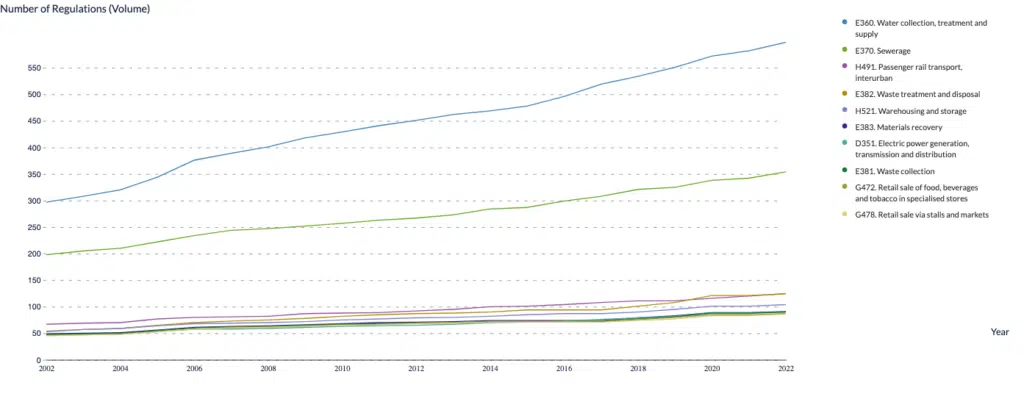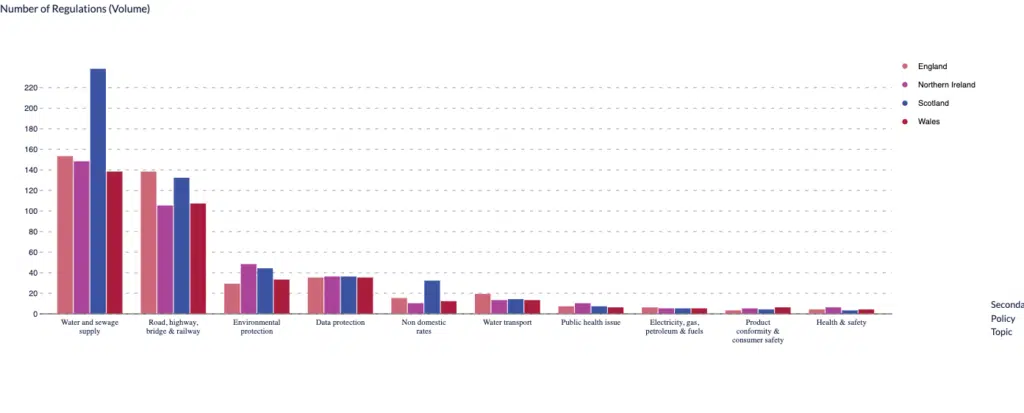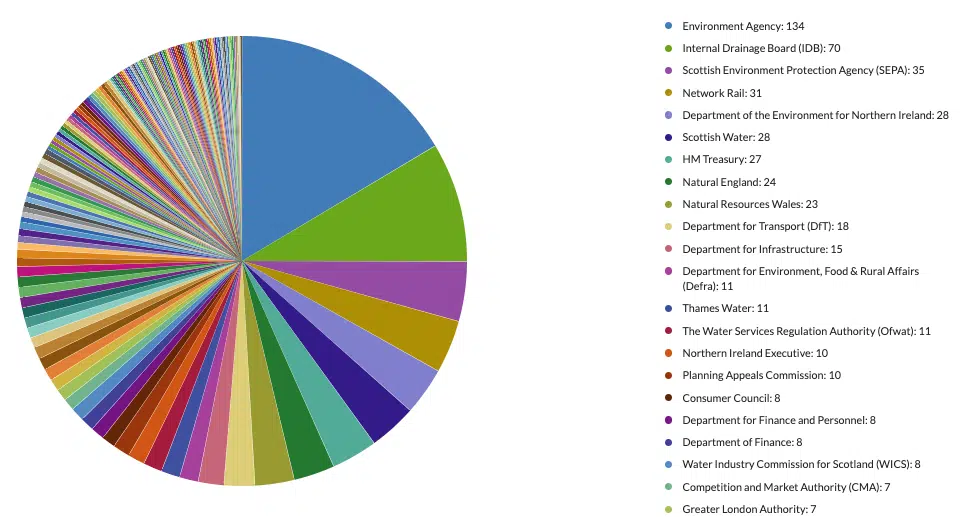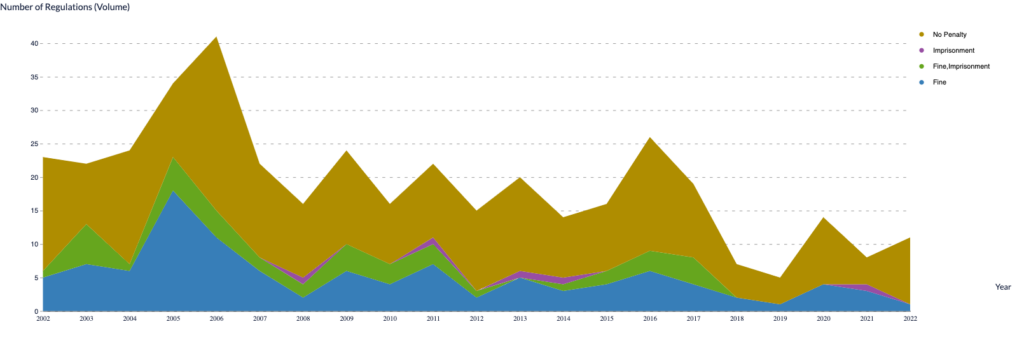
The 25-year environment plan set by the government in 2018 established the objective of achieving “clean and plentiful water” while outlining a proposal to reduce the impact of wastewater. However, according to the Environment Agency’s annual assessment of water and sewerage company performance in 2021, published in July 2022, water companies reached their lowest-ever level, with a majority experiencing a decline in their performance.
The Environment Agency has warned that without significant changes, the UK will face a water shortage in the next 20 years, unable to meet the rising water demand. This article centres around the governmental approach to treating sewage in the UK. Additionally, it presents an outline of the government’s policy to mitigate phosphorus loadings originating from treated wastewater.
Regulations Overview
Various Acts of Parliament and European Directives govern England and Wales’s water and sewerage industries.
These legal frameworks encompass various important aspects, including:
- economic regulation of the sector
- water supply sewerage services
- drinking water quality
- environmental standards
- customer service flood
- and drought protection and adaptation
National Legislation
The privatisation of the former water authorities was enabled by the Water Act of 1989. Subsequently, legislation related to water was consolidated and incorporated into new Acts of Parliament.
These Acts included:
- The Water Industry Act of 1991 outlines the key powers and responsibilities of water and sewerage companies, replacing the provisions of the Water Act 1989. It also defines the authority and capabilities of the Director General of Water Services, currently known as the Water Services Regulation Authority (Ofwat).
- The Water Resources Act of 1991 establishes a framework for the functions of the National Rivers Authority, now known as the Environment Agency. Additionally, this act introduced water quality classifications and objectives.
Regulation Revision
Legislation governing the standards for wastewater treatment is outlined in the Urban Waste Water Treatment Directive. This Directive specifies the minimum requirements that must be met and is presently applicable to the UK. The Commission revised the Directive on 26 October 2022, following a thorough evaluation and extensive impact assessment, ensuring alignment with the latest standards. The objective of this revision is to achieve the following:
- Reduction of pollution, energy consumption, and greenhouse gas emissions.
- Enhancement of water quality by addressing urban wastewater pollution that persists.
- Improvement of sanitation access, particularly for vulnerable and marginalised populations.
- Imposition of financial responsibility on industries for micropollutant treatment.
- Mandating EU countries to monitor pathogens in wastewater.
- Promotion of a more circular approach within the sector.
By the year 2040, these new rules are projected to deliver the following outcomes:
- Annual savings of nearly EUR 3 billion across the European Union.
- Reduction of greenhouse gas emissions by over 60% compared to the levels recorded in 1990.
- Decrease in water pollution by more than 365 thousand tonnes.
- Reduction of microplastic emissions by 9%.
Regulations impacted water and sewage companies over the past 20 years, as shown in the table below, with a focus on water collection, treatment, and supply but less emphasis on waste treatment and disposal.

UK Regulations on Water & Sewage between 2002 and 2022, grouped by applicable ONS SIC code (Data Source: Law Notion, 2023 May)
Geo and topic differences
The regulation in England, Northern Ireland, Scotland, and Wales encompass various aspects, but certain differences exist. Scotland, for instance, places a relatively greater emphasis on water and sewage supply regulations. To uphold environmental standards, the Scottish Environment Protection Agency (SEPA) oversees Scottish Water’s compliance with environmental requirements. Additionally, SEPA guides ministers regarding prospective investments in environmental enhancements.

Authority
These entities play crucial roles in setting standards, enforcing regulations, and representing the interests of consumers. Here are some authorities that hold responsibility for overseeing the water and sewage.
- Environment Agency – is an executive non-departmental public body that reports to the Secretary of State for the Department for Environment, Food and Rural Affairs (Defra). It determines the amount of water that can be abstracted from the environment. Additionally, the Environment Agency sets and enforces standards for the treated wastewater that is discharged into rivers and the sea.
- Department for Environment, Food and Rural Affairs (Defra) – It is responsible for water policy and regulations in England and Wales. Defra sets the standards for drinking water quality and environmental regulations that water companies must adhere to.
- Water Services Regulation Authority (Ofwat) – is the economic regulator for England and Wales’s water and sewerage sectors. Its primary responsibility is to ensure that water companies provide high-quality and efficient services to consumers at a fair price. Ofwat plays a leading role in reviewing and regulating water prices.
- Consumer Council for Water (CCW)– represents customers’ interests in price, service, and value for money. It advocates for consumers and addresses customer complaints regarding water quality.
- The Drinking Water Inspectorate (DWI) – is responsible for drinking water quality standards in England and Wales. It ensures that water suppliers comply with regulations and maintain the required standards for drinking water safety.

Penalty
Since 2015, the Environment Agency has enforced fines totalling more than £144 million, with Southern Water being subjected to a substantial penalty of £90 million. However, according to the Environment Agency’s annual assessment of water and sewerage companies, the overall performance of water companies reached its lowest level ever, with most companies experiencing a decline. The Environment Agency expressed concern that the current penalties imposed by the courts are insufficient to deter water companies from violating environmental laws. As a result, they called for significantly higher fines, including the possibility of prison sentences for Chief Executives and Board members responsible for serious incidents.

Conclusion
The current state of water and sewage management in the UK presents significant challenges and calls for effective measures to address the declining environmental performance of water companies. Despite the government’s 25-year environment plan and the establishment of regulatory frameworks, the latest assessment by the Environment Agency highlights a decline in the environmental performance of water companies, raising concerns about future water shortages and the ability to meet rising demand.
Law Notion can provide policymakers with valuable insights and tools to assess the effectiveness of existing regulations, identify areas for improvement, and develop new policies that prioritise environmental protection. By analysing the current legal frameworks governing water and sewage industries, policymakers can gain a comprehensive understanding of the economic, environmental, and challenges that need to be addressed. This analysis can help identify gaps, inconsistencies, and areas of non-compliance, enabling policymakers to propose regulations that promote sustainable water management and protect the environment.
